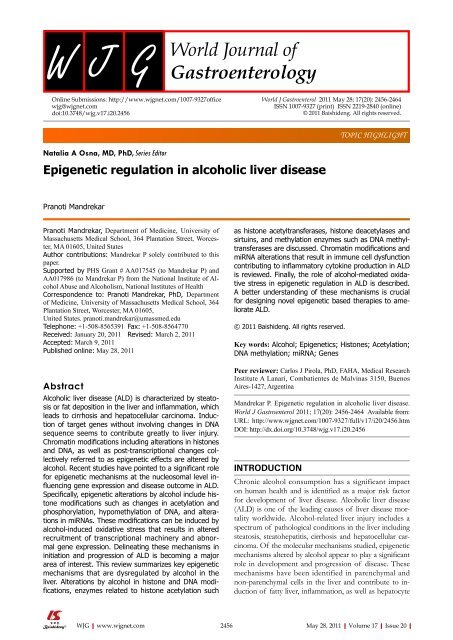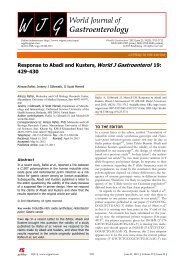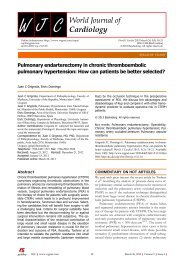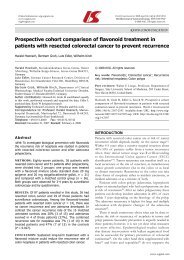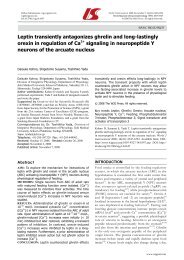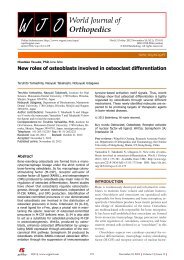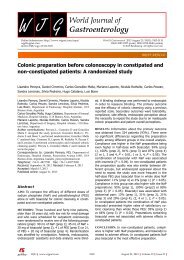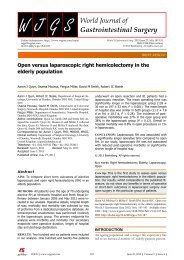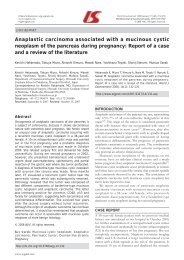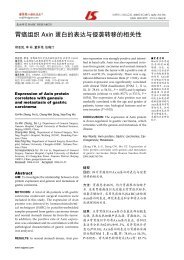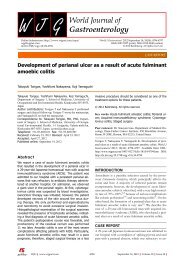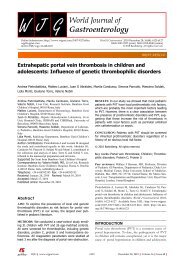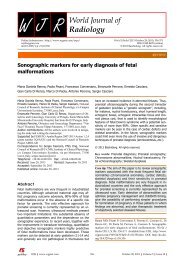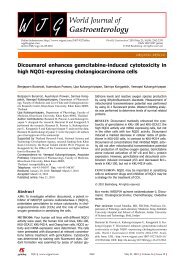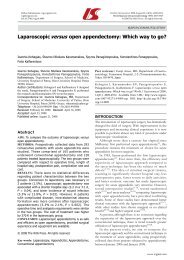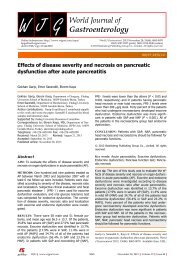20 - World Journal of Gastroenterology
20 - World Journal of Gastroenterology
20 - World Journal of Gastroenterology
You also want an ePaper? Increase the reach of your titles
YUMPU automatically turns print PDFs into web optimized ePapers that Google loves.
Online Submissions: http://www.wjgnet.com/1007-9327<strong>of</strong>fice<br />
wjg@wjgnet.com<br />
doi:10.3748/wjg.v17.i<strong>20</strong>.2456<br />
Natalia A Osna, MD, PhD, Series Editor<br />
Epigenetic regulation in alcoholic liver disease<br />
Pranoti Mandrekar<br />
Pranoti Mandrekar, Department <strong>of</strong> Medicine, University <strong>of</strong><br />
Massachusetts Medical School, 364 Plantation Street, Worcester,<br />
MA 01605, United States<br />
Author contributions: Mandrekar P solely contributed to this<br />
paper.<br />
Supported by PHS Grant # AA017545 (to Mandrekar P) and<br />
AA017986 (to Mandrekar P) from the National Institute <strong>of</strong> Alcohol<br />
Abuse and Alcoholism, National Institutes <strong>of</strong> Health<br />
Correspondence to: Pranoti Mandrekar, PhD, Department<br />
<strong>of</strong> Medicine, University <strong>of</strong> Massachusetts Medical School, 364<br />
Plantation Street, Worcester, MA 01605,<br />
United States. pranoti.mandrekar@umassmed.edu<br />
Telephone: +1-508-8565391 Fax: +1-508-8564770<br />
Received: January <strong>20</strong>, <strong>20</strong>11 Revised: March 2, <strong>20</strong>11<br />
Accepted: March 9, <strong>20</strong>11<br />
Published online: May 28, <strong>20</strong>11<br />
Abstract<br />
Alcoholic liver disease (ALD) is characterized by steatosis<br />
or fat deposition in the liver and inflammation, which<br />
leads to cirrhosis and hepatocellular carcinoma. Induction<br />
<strong>of</strong> target genes without involving changes in DNA<br />
sequence seems to contribute greatly to liver injury.<br />
Chromatin modifications including alterations in histones<br />
and DNA, as well as post-transcriptional changes collectively<br />
referred to as epigenetic effects are altered by<br />
alcohol. Recent studies have pointed to a significant role<br />
for epigenetic mechanisms at the nucleosomal level influencing<br />
gene expression and disease outcome in ALD.<br />
Specifically, epigenetic alterations by alcohol include histone<br />
modifications such as changes in acetylation and<br />
phosphorylation, hypomethylation <strong>of</strong> DNA, and alterations<br />
in miRNAs. These modifications can be induced by<br />
alcohol-induced oxidative stress that results in altered<br />
recruitment <strong>of</strong> transcriptional machinery and abnormal<br />
gene expression. Delineating these mechanisms in<br />
initiation and progression <strong>of</strong> ALD is becoming a major<br />
area <strong>of</strong> interest. This review summarizes key epigenetic<br />
mechanisms that are dysregulated by alcohol in the<br />
liver. Alterations by alcohol in histone and DNA modifications,<br />
enzymes related to histone acetylation such<br />
WJG|www.wjgnet.com<br />
2456<br />
<strong>World</strong> J Gastroenterol <strong>20</strong>11 May 28; 17(<strong>20</strong>): 2456-2464<br />
ISSN 1007-9327 (print) ISSN 2219-2840 (online)<br />
© <strong>20</strong>11 Baishideng. All rights reserved.<br />
as histone acetyltransferases, histone deacetylases and<br />
sirtuins, and methylation enzymes such as DNA methyltransferases<br />
are discussed. Chromatin modifications and<br />
miRNA alterations that result in immune cell dysfunction<br />
contributing to inflammatory cytokine production in ALD<br />
is reviewed. Finally, the role <strong>of</strong> alcohol-mediated oxidative<br />
stress in epigenetic regulation in ALD is described.<br />
A better understanding <strong>of</strong> these mechanisms is crucial<br />
for designing novel epigenetic based therapies to ameliorate<br />
ALD.<br />
© <strong>20</strong>11 Baishideng. All rights reserved.<br />
Key words: Alcohol; Epigenetics; Histones; Acetylation;<br />
DNA methylation; miRNA; Genes<br />
Peer reviewer: Carlos J Pirola, PhD, FAHA, Medical Research<br />
Institute A Lanari, Combatientes de Malvinas 3150, Buenos<br />
Aires-1427, Argentina<br />
Mandrekar P. Epigenetic regulation in alcoholic liver disease.<br />
<strong>World</strong> J Gastroenterol <strong>20</strong>11; 17(<strong>20</strong>): 2456-2464 Available from:<br />
URL: http://www.wjgnet.com/1007-9327/full/v17/i<strong>20</strong>/2456.htm<br />
DOI: http://dx.doi.org/10.3748/wjg.v17.i<strong>20</strong>.2456<br />
INTRODUCTION<br />
TOPIC HIGHLIGHT<br />
Chronic alcohol consumption has a significant impact<br />
on human health and is identified as a major risk factor<br />
for development <strong>of</strong> liver disease. Alcoholic liver disease<br />
(ALD) is one <strong>of</strong> the leading causes <strong>of</strong> liver disease mortality<br />
worldwide. Alcohol-related liver injury includes a<br />
spectrum <strong>of</strong> pathological conditions in the liver including<br />
steatosis, steatohepatitis, cirrhosis and hepatocellular carcinoma.<br />
Of the molecular mechanisms studied, epigenetic<br />
mechanisms altered by alcohol appear to play a significant<br />
role in development and progression <strong>of</strong> disease. These<br />
mechanisms have been identified in parenchymal and<br />
non-parenchymal cells in the liver and contribute to induction<br />
<strong>of</strong> fatty liver, inflammation, as well as hepatocyte<br />
May 28, <strong>20</strong>11|Volume 17|Issue <strong>20</strong>|


